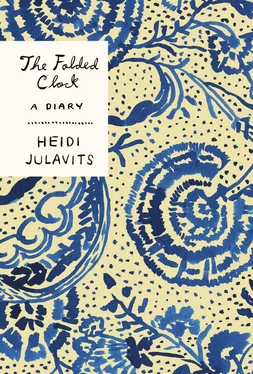In the midst of what I understood as our mutual infatuation, I flew to Zurich to meet my London friend and see and experience the building/spa in the Swiss Alps. The architect was thrilled to learn I was going to visit this building that he’d already visited numerous times and about which he’d written many papers. (“I am so happy you discovered it.”)
While in Switzerland at the building, I sent the architect an e-mail — my first-ever e-mail to him — wondering about our cold library (had it snowed inside?) and asking about a nearby restaurant he’d mentioned liking.
When I returned to the villa, the architect sent me PowerPoint presentations about the building/spa and its architect (whom he considered “the world’s greatest living architect”). I sent him photos of a Swiss house built into the side of a mountain that, from a distance, looks like the site of a meteor crash. The next night — after firmly and energetically bonding over the world’s greatest living architect, thereby cementing our love via the creative genius of a third party — I ignored him. I couldn’t help myself. My teen mating instinct kicked in. ( La tendresse Américaine on which I was raised deemed you must strongly discourage a man after you strongly encourage him as a way to more yet strongly encourage him.) We were at dinner with a group of people. I did not meet his eye. I very visibly engaged others in conversation. I took great pains to appear to be having quite a bit more fun while not talking to him than I ever did while talking to him.
Our romance, such as it never existed, started to wane. Either he realized that he really liked me and could not bear to be ignored but also could not, in good conscience, follow through on his desires (we were both married), and so needed to “break off” this relationship we did not have. Or he realized I was a ridiculous person who likes to play games — card games, silly games of the heart, harmless, all of them, but therein lay the problem: I was a frivolous person who just happened to share his taste in buildings. Or maybe our infatuation was entirely one-sided. Even more ridiculously, perhaps I’ve fabricated this entire situation, and he’s simply confused but more likely uninterested by my middle-school bizarreness. Recently the architect sent an e-mail to a much older woman on whom I am certain he does not have a crush. He’d written to her about a Bauhaus building. She forwarded his note to me (she knows I am also a Bauhaus fan). I saw he’d written to her, of this building, “I am so happy you discovered it.”
I am the only one working in the cold library today.
Today I turned the wrong knob on my stove when I tried to boil water. The burner knobs on my two stoves are reversed. To fire up the front burner in New York, I turn the left knob. To fire up the front burner in Maine, I turn the right one. When I move from the apartment to the house (or the house to the apartment), I spend many days unthinkingly turning the wrong knob and igniting the wrong burner. Like a magician off her game, I throw fire where I didn’t mean to throw it. I have to remind myself: You are not where you just were. Things are different here. I get mad at myself because I hate to waste time, even if it’s only one one-hundredth of a second. I watched the Olympics this summer. One one-hundredth of a second is no joke. One one-hundredth of a second is the difference between gold and last place. I also hate to think about actions that shouldn’t require thinking. I need the mechanics of my life to be effortless. When appliances don’t work, I cannot be my best person. I actually become a bad person. I am not a patient mother when the machines, in addition to the people, require attention. I become like the real estate woman in Maine who showed me the Odd Fellows Hall the other day. The woman, nearing eighty, emerged from her car wielding a butter knife. (The hall has no keys.) She used the knife to jimmy the lock, but the lock wouldn’t spring, and she grew frustrated, and I saw in her what I see in myself when plain things that should work do not — that I have the capacity to turn, with the quickness of a lightning strike, unkind.
But I am also reassured by my failure to turn the correct stove knob in New York. This meant that, though back, I was not yet fully back. Even though I’d already forgotten the calm of the past three months, my muscle memories had yet to be overridden. I am still in that place where real estate agents unlock empty houses with butter knives. My Maine neighbor, an occasional electrician, warned me when he changed our bathroom light from a pull chain to a light switch: “You’ll be reaching for that chain for weeks.” He was right. I was incapable of remembering the chain was no longer there. A year later, I still grope in the dark at the dark.
Today I fought with my husband. He is on a diet, not for vanity’s sake but because of a recent encounter with a scary illness. A person might think — given my own recent encounter with a scary illness — that I would unreservedly support his wellness pursuit. I do not. Until today I have acted supportive, but beneath my support a dark undertow lurked. I’d kept this undertow a secret from him. Instead I confessed my baffling hostility toward his diet to my female friends. All of them, I was surprised to learn, are or were once involved with men who’d experimented with diets for reasons of health. I discovered that the male diet is a potent relationship disharmonizer. “Threatened” is the word that arose most frequently when I spoke to women about their male dieting partners, as in “I am/was threatened by his diet.” The obvious interpretation of our reaction was this: we feared that our husbands desired to look slimmer and healthier because they’d met another woman and planned, once their transformation was complete, to leave us.
But we weren’t scared of being left. Maybe we should have been, but we weren’t. We were resentful. The dieting man does not eat the same food as the rest of his family — the diets we were speaking about were not “eat more healthy foods” diets. These diets required extreme abstinence and often had a cultish whiff to them. The adherents of these diets made YouTube videos that were both compelling and disturbing. People lost so much weight that their skulls shrank.
We tried to parse our feelings of endangerment. Was gender primarily to blame? By being on a diet, our husbands were (albeit for very different reasons) behaving like so many of our female friends, some of whom developed eating disorders and became incredibly boring. I was one of those women for a year. Luckily I was able to escape what is often, tragically, inescapable. When I emerged from my brief anorexia incarceration I thought: Well that was a very huge waste of my time . The monomaniacal dedication of brain activity required to maintain an eating disorder was an inexcusable squandering of one of my best brain years. Plus the obsession was inherently perverse. Even though I was fixated upon nothing but my body, my brain was somehow totally disengaged, save intellectually, from its singular concern. My body, despite the molecular-level attention paid to it, belonged to a faraway creature, a numb, gray sylph.
Also I did not tell my friends, but to myself I admitted: I was jealous. I was jealous of Dr. Fuhrman, the man who masterminded the diet my husband is following. My husband seems to believe most everything Fuhrman says, and this affronts me because my husband doesn’t believe most everything I say. My husband approaches my claims with a loving but skeptical eye. He doesn’t not question what I say, but occasionally he believes certain ridiculous statements I make because I have probably exhausted him into a place of acceptance. Fuhrman’s claims do not exhaust my husband, even though Fuhrman advocates something called “the Nutritarian Food Pyramid,” which sounds to me acceptable only under circumstances of extreme exhaustion. Also my husband is not as sensitive as I am; he does not understand the title of Fuhrman’s book —Eat to Live —as just so bitchy and rebuking.
Читать дальше












